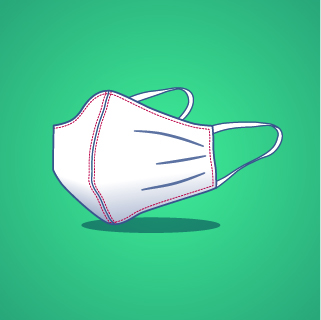
Our editorial team is taking a short break for summer. Before we go, we’re sharing some tips to help you get the most out of your face coverings, so that you keep cool and COVID-safe this August.
July and August have some of the hottest days of the year in Canada. Hot, humid weather poses significant risks for heat-related injuries, including heat stroke, exhaustion, and cramps, and individuals with cardiovascular disease are at elevated risk.
We can’t control the weather, but we can make heart-healthy choices to help us weather the weather.
- Dr. Thais Coutinho

“Hot, humid, hazy weather can be dangerous for people with cardiac or blood pressure conditions requiring them to use specific medications such as diuretics, beta-blockers or calcium channel blockers, for example,” says Dr. Thais Coutinho, the head of the Division of Cardiac Prevention and Rehabilitation at the University of Ottawa Heart Institute (UOHI), and chair of the Canadian Women’s Heart Health Centre. “In extreme heat conditions, the heart must work harder to pump blood to the surface of the skin for sweating, which cools the body. Some of the medications used for heart disease or high blood pressure can exacerbate the body’s response to the heat or prevent the body from adapting quickly to the abrupt changes in temperature.”
Complicating matters more, while we’re all fighting to keep cool this summer, we must also contend with another threat: COVID-19. Mandatory mask laws are spreading in Canada, but the practice of wearing a mask – especially in extreme heat conditions – is not always comfortable or pleasant.
Fortunately, there are simple strategies to make the most of your mask. Here are some tips we’ve sourced from The Star Tribune, CTV News, and Johns Hopkins Medicine that will help keep you COVID-safe and your heart cool.
- Avoid the heat – Extreme heat and humidity can make it difficult to breathe through your mask. Therefore, the best way to avoid a heat-related injury or discomfort from wearing one in hot weather is to stay out of it. If you must go outside, plan to do so when it’s coolest, like in the morning or in the hours after dinner.
- Choose a light, breathable material – Masks should be comfortable to wear, but also practical for protecting against the spread of disease. Choose masks made of breathable materials, like cotton, rather than synthetic fabrics like polyester, which lock in heat and make it harder to breathe.
- Wear a mask that fits – Fit is as important as function. If your mask sags, you’ll be tempted to adjust it constantly, and doing so without properly disinfecting your hands could potentially expose you to the virus. Ensure your mask fits snug to the sides of your face, that its straps or ties do not irritate the skin behind your ears, and that the front covering leaves enough room to feel comfortable but does not obstruct your breathing. A mask that is too tight will lock in heat and moisture and will be uncomfortable to wear.
- Limit the time you spend wearing your mask – If you must go outside in the heat, plan your trips around the number of masks you have with you, and wear a mask only when you need one. Masks are meant to be worn in places where physical distancing is not always possible, especially in indoor commercial settings like stores where many people gather.
- Bring extra masks just in case – Having extra masks on hand is never a bad idea, especially if you can’t avoid being out in public in hot weather for extended periods. If your mask becomes damp or wet from your breath or sweat, it needs to be changed to remain effective. Wet masks can cling to your face, locking in heat and irritating your skin. Follow proper hand hygiene before touching your mask and wash your used masks before wearing them again.
“We can’t control the weather, but we can make heart-healthy choices to help us weather the weather,” says Dr. Coutinho. “Similarly, mindfulness about wearing face masks safely can help us limit the spread of COVID-19 in our community.”
Common signs of heat-related injury include headache, nausea and vomiting, lightheadedness, dizziness, muscle aches and twitches, heavy sweating, a rapid pulse, and cold, clammy skin. Seek medical attention right away if you think you are having a heat stroke, as this is a medical emergency.
For more information about how you and your family and friends can maintain a COVID-safe and heart-healthy lifestyle this summer, consult the University of Ottawa Heart Institute’s Prevention and Wellness website.


